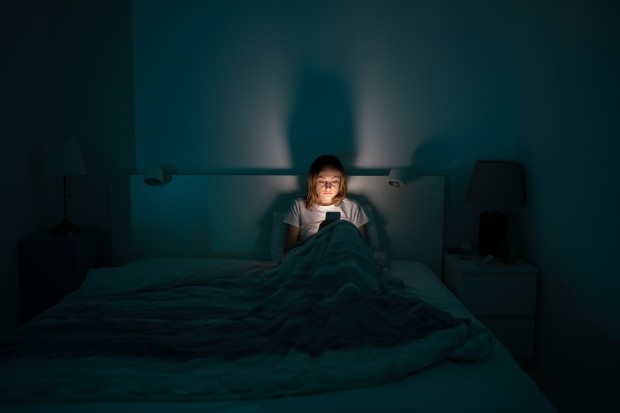Fabulous
Is your phone addiction making you sick? Here are the 8 signs to watch out for, from Tinder finger to tech neck
Taking calls for as little as 30 minutes a week can raise your chances of developing high blood by 12 per cent, a study at China’s Southern Medical University found.

Four hours a week may increase that danger by 16 per cent, and six hours by 25 per cent.
Here, we reveal other ways your handset can affect body and mind — and how to stay well.
NOMO NOT FOMO: If you cannot bear being parted from your handset, this may be “no mobile phone phobia” — dubbed nomophobia.
A YouGov study found 53 per cent of smartphone users feel anxious when they misplace their phone, the battery dies or they have no signal.
Face the fear. Start by leaving the phone behind, or well away from you, and gradually increase your time apart from it.
TINDER FINGER: If you are a non-stop swiper or cannot refrain from texting and have pain in your fingers, this may be a condition known as Tinder Finger, or Texting Thumb.
A 2019 study in the Journal of Public Health found that while discomfort may be short-term, it can lead to tendonitis if left untreated, and even long-term disability.
So curb the habit — take breaks from heavy texting or typing every 20 minutes.
PHANTOM PHONE POCKET SYN-DROME: This is when you reckon you had an alert but there are no new messages.
Research in the US, at the Georgia Institute of Technology, found 90 per cent of people suffer from this, when the phone becomes an extension of “you”.
Keeping it on your desk or a nearby table can ease symptoms. If not, cognitive behavioural therapy may help.
NIGHT SCROLLING DAMAGES EYES: We check our phone on average 150 times a day, and a study in Texas found using it late at night raises the risk of long-term eye issues such as macular degeneration — when the centre of the retina, the macula, deteriorates and vision is distorted or lost.
Latest News
Taking calls for as little as 30 minutes a week can raise your chances of developing high blood by 12 per cent, a study at China’s Southern Medical University found.

Four hours a week may increase that danger by 16 per cent, and six hours by 25 per cent.
Here, we reveal other ways your handset can affect body and mind — and how to stay well.
NOMO NOT FOMO: If you cannot bear being parted from your handset, this may be “no mobile phone phobia” — dubbed nomophobia.
A YouGov study found 53 per cent of smartphone users feel anxious when they misplace their phone, the battery dies or they have no signal.
Face the fear. Start by leaving the phone behind, or well away from you, and gradually increase your time apart from it.
TINDER FINGER: If you are a non-stop swiper or cannot refrain from texting and have pain in your fingers, this may be a condition known as Tinder Finger, or Texting Thumb.
A 2019 study in the Journal of Public Health found that while discomfort may be short-term, it can lead to tendonitis if left untreated, and even long-term disability.
So curb the habit — take breaks from heavy texting or typing every 20 minutes.
PHANTOM PHONE POCKET SYN-DROME: This is when you reckon you had an alert but there are no new messages.
Research in the US, at the Georgia Institute of Technology, found 90 per cent of people suffer from this, when the phone becomes an extension of “you”.
Keeping it on your desk or a nearby table can ease symptoms. If not, cognitive behavioural therapy may help.
NIGHT SCROLLING DAMAGES EYES: We check our phone on average 150 times a day, and a study in Texas found using it late at night raises the risk of long-term eye issues such as macular degeneration — when the centre of the retina, the macula, deteriorates and vision is distorted or lost.

Jennifer Lopez looks ageless in a towel in no-makeup video

Amanda Holden spanks her derriere and thanks Spanx

Amanda Holden shows off more than bargained as she dances around in her outfit of the day

Meet Harley Cameron, the stunning model who went from a BKFC ring girl to become a pro wrestler and found love

GreenGirlBella, Rocks Emirates Stadium in Painted Home Kit

Amanda Holden calls herself a 'good girl' in white dress with 'cheeky' split

Mum slammed by parents after flashing thong in school run outfit

Lottie Moss makes jaws dropp as she shows off her flawless body

Amanda Holden wears nothing beneath plunging white dress












Comments
Written news comments are in no way https://www.showbizglow.com it does not reflect the opinions and thoughts of. Comments are binding on the person who wrote them.